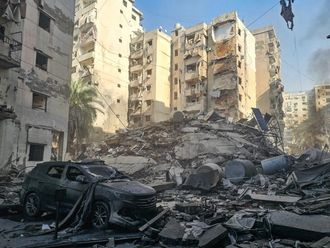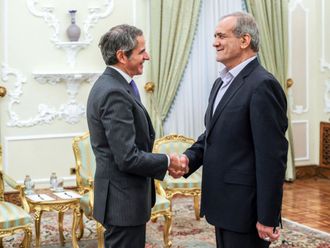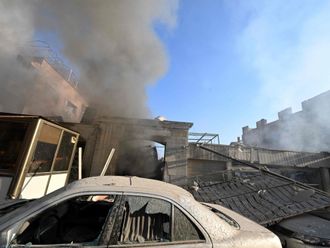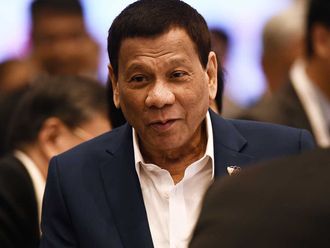Damascus: Syrian social media networks have been abuzz with promotional videos for the past three days, celebrating the arrival of Colonel Suhail Hassan, a decorated member of the Syrian Army, to the outskirts of Eastern Ghouta, the agricultural belt surrounding Damascus.
He has promised to “liberate it fully” from the armed opposition, who have been in control of Al Ghouta since 2012. Nicknamed ‘Al Nimr’ or ‘The Tiger’, Hassan is famous in Syrian regime circles for not losing a single battle since he was deployed to the warfronts six years ago. Pro-regime activists hail him as a war hero while members of the opposition abhor him, calling him a war criminal.
Videos of Colonel Hassan’s troops parading on the main road to Al Ghouta have gone viral, side-by-side with endless lines of armoured vehicles, tanks, and warplanes. Russian media is marketing them as the most sophisticated ever used in the seven-year Syrian conflict. Thousands of troops have been transported to the vicinity of Al Ghouta, for what pro-regime media is describing as the “final battle for Damascus”.
According to sources who spoke to Gulf News, “The videos are mainly intended to frighten the rebels — psychological warfare at its best. A four-day negotiations period ends at midnight today [Monday]. Suhail Hassan will give them two options: Surrender, through a face-saving reconciliation process, or suffer collective annihilation. If they go to war, they will lose. It would be wiser to surrender and save as many lives as possible, on both sides of the conflict.”
This means that the Al Ghouta-based rebels will surely retaliate against the capital itself, as they have often done when regime bombardment became too aggressive over the past few years, killing tens of innocents. Government schools in the range of opposition missiles have been suspended for three days, and many private sector businesses in the Syrian capital have closed, fearing retaliation.
The indiscriminate attacks had dwindled in recent months, only to surge earlier this month, as regime troops launched a new assault on Al Ghouta, claiming the “de-conflict zone” agreement for the Damascus countryside, reached at the Astana talks last May, had now expired.
Back then, Russia, Turkey, and Iran had agreed to create four “de-conflict” or ceasefire zones in Syria, aimed at preventing the deployment of tanks and soldiers from entering districts in the countryside of Damascus and Homs, in the city of Idlib in the Syrian northwest, and throughout southern Syria, from the Jordanian border all the way to the city of Suwaida in the Druze Mountains.
Russian military police marched into southern Syria and Al Ghouta, helping patrol and police the area, serving as a buffer between government troops and rebel forces, while promising to keep all “non-Syrian” combatants at bay, a reference to Jabhat Al Nusra, Al Qaida, Daesh, and Hezbollah.
The “de-conflict zones” have not prevented the Russians from carrying out midnight blitzes on Al Ghouta, claiming to be targeting Jabhat Al Nusra and its allies among the Syrian armed opposition.
Human rights groups have raised red flags, however, saying that as the Syrian and Russian bombing intensifies, Al Ghouta is running short of food and medical supplies. They add that more than 270 civilians have been killed in regime air strikes.
After visiting the area in mid-February, the United Nations described the situation as “far graver than imagined” with UN reports comparing the malnutrition level to those in the sub-Saharan Africa. “Humanitarian diplomacy has failed so far. We’re talking to deaf ears,” said Panos Moumtzis, the UN Regional Coordinator.
Al Ghouta has been completely sealed off by the Russians since they entered the Syrian battlefield in September 2015. Two months later, they killed Zahran Alloush, the prime rebel leader in Douma, the principle town of Al Ghouta on Christmas Day in 2015. Former backers of the armed opposition in Al Ghouta, like Saudi Arabia and Turkey, have seemingly lost interest in the rebel enclave, and are unwilling to pick a fight with the Russians.
This has prompted Zahran’s cousin, Mohammad Alloush, current commander of the Islamic Army, to accept a political settlement through the Astana Process, which he has attended since early 2017.
Unlike Kurdish territories in the Syrian northeast, Al Ghouta has no oil or international borders. Previously famed for its agricultural fields, all of them have been torched since the fighting started in 2011. No new arms have entered the area since 2015, leaving the armed opposition to work with what they had amassed before then, and the leftovers of army bases in Al Ghouta.
Along with Idlib, the towns and cities of Al Ghouta are the last remaining pockets of opposition rule throughout Syria. If restored to the regime control by mid-March, it would be a great setback for the Syrian opposition. Amer Elias, an analyst and member of the ruling Baath Party, told Gulf News: “The entire war was launched with the logic of laying siege to Damascus. It ends when all threats to Damascus are eradicated.”












